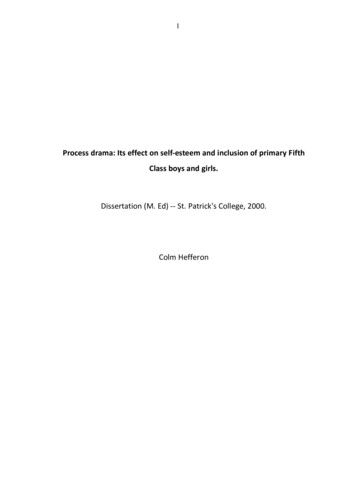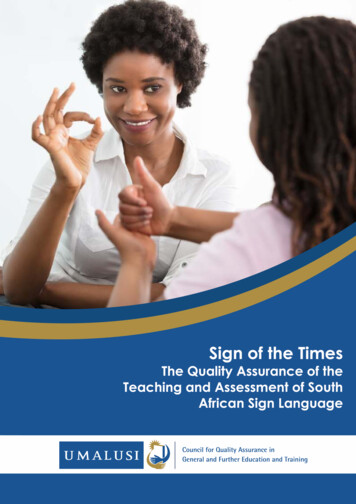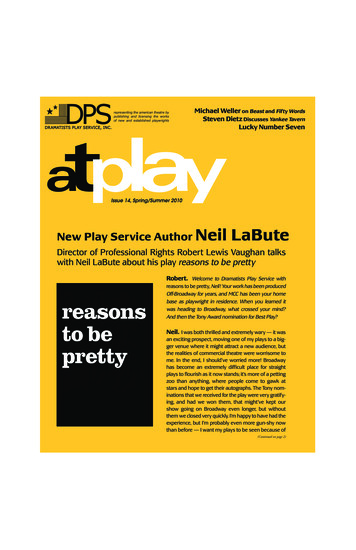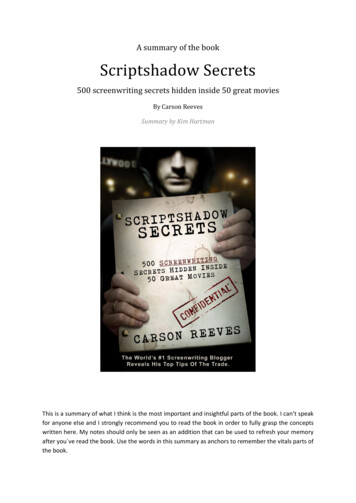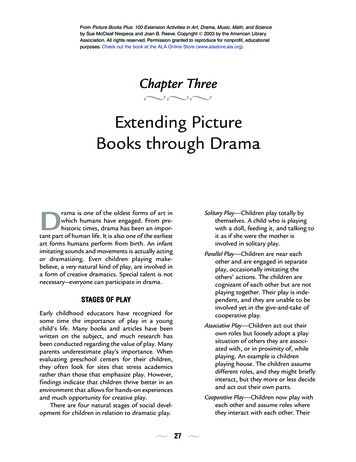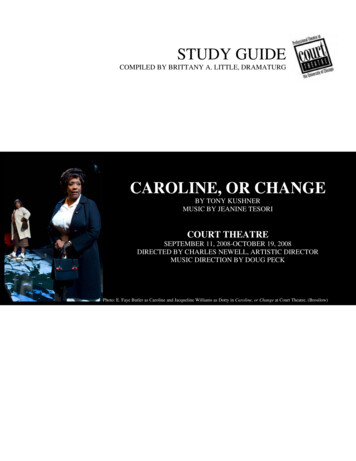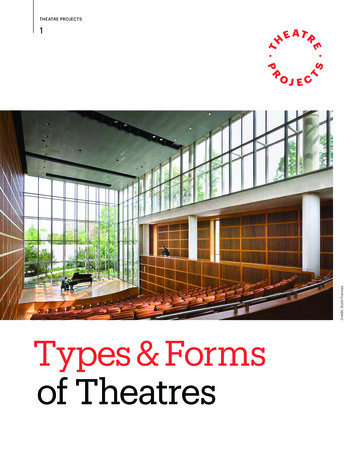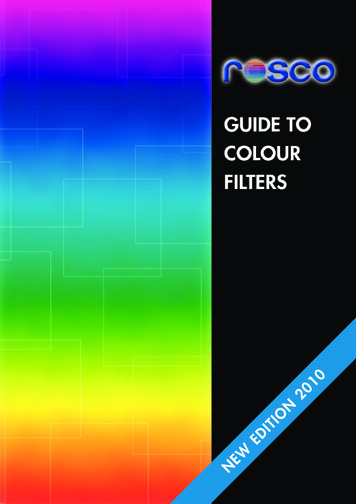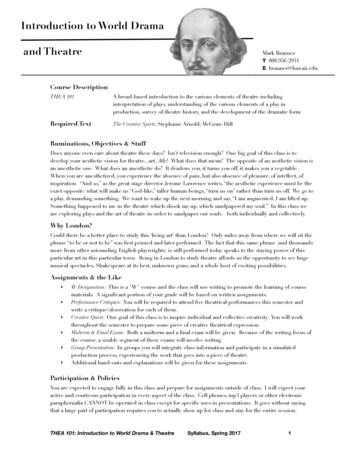
Transcription
Introduction to World Dramaand TheatreMark BrannerT 808.956.2931E branner@hawaii.eduCourse DescriptionTHEA 101A broad-based introduction to the various elements of theatre includinginterpretation of plays, understanding of the various elements of a play inproduction, survey of theatre history, and the development of the dramatic form.Required TextThe Creative Spirit; Stephanie Arnold; McGraw-HillRuminations, Objectives & StuffDoes anyone even care about theatre these days? Isn’t television enough? One big goal of this class is todevelop your aesthetic vision for theatre.art.life! What does that mean? The opposite of an aesthetic vision isan anesthetic one. What does an anesthetic do? It deadens you, it turns you off, it makes you a vegetable.When you are anesthetized, you experience the absence of pain, but also absence of pleasure, of intellect, ofinspiration. “And so,” as the great stage director Jerome Lawrence writes, “the aesthetic experience must be theexact opposite: what will make us “God-like,” taller human beings, “turn us on” rather than turn us off. We go toa play, demanding something. We want to wake up the next morning and say, “I am augmented, I am lifted up.Something happened to me in the theatre which shook me up, which sandpapered my soul.” In this class weare exploring plays and the art of theatre in order to sandpaper our souls – both individually and collectively.Why London?Could there be a better place to study this ‘living art’ than London? Only miles away from where we will sit thephrase “to be or not to be” was first penned and later performed. The fact that this same phrase (and thousandsmore from other astounding English playwrights) is still performed today speaks to the staying power of thisparticular art in this particular town. Being in London to study theatre affords us the opportunity to see hugemusical spectacles, Shakespeare at its best, unknown gems, and a whole host of exciting possibilities.Assignments & the Like‣‣‣‣‣‣W Designation: This is a "W" course and the class will use writing to promote the learning of coursematerials. A significant portion of your grade will be based on written assignments.Performance Critiques: You will be required to attend five theatrical performances this semester andwrite a critique/observation for each of them.Creative Quest: One goal of this class is to inspire individual and collective creativity. You will workthroughout the semester to prepare some piece of creative theatrical expression.Midterm & Final Exam: Both a midterm and a final exam will be given. Because of the writing focus ofthe course, a sizable segment of these exams will involve writing.Group Presentation: In groups you will integrate class information and participate in a simulatedproduction process, experiencing the work that goes into a piece of theatre.Additional hand-outs and explanations will be given for these assignments.Participation & PoliciesYou are expected to engage fully in this class and prepare for assignments outside of class. I will expect youractive and courteous participation in every aspect of the class. Cell phones, mp3 players or other electronicparaphernalia CANNOT be operated in class except for specific uses in presentations. It goes without sayingthat a large part of participation requires you to actually show up for class and stay for the entire session.THEA 101: Introduction to World Drama & TheatreSyllabus, Spring 20171
Course ScheduleSession 1Session 2Session 3Session 4Session 5Session 6Session 7Session 8Session 9Session 10Session 11Session 12Session 13Session 14Session 15Session 16Session 17Session 18Session 19Session 20Session 21Session 22Session 23Session 24Session 25Session 26Session 27Session 28Session 29Session 30Session 31Session 32GradingParticipationCreative QuestMidterm ExamIntroductionThe Impulse to PerformTheatre & SocietyTheatre & SocietyThe Playwright’s VisionThe Playwright’s VisionLondon Theatre Outing #1The Art of the ActorStyle: RealismWorldview: RealismLondon Theatre Outing #2Introduction: Other WorldsStyle: TheatricalismWorldview: TheatricalismLondon Theatre Outing #3Midterm ReviewMidterm ExamThe Art of the DirectorTheatre GenresLondon Theatre Outing #4Other WorldsOther WorldsMusical TheatreCreative QuestsCreative QuestsLondon Theatre Outing #5Project PreparationProject PreparationProject PreparationGroup ProjectsGroup ProjectsFinal Exam 10% 10% 20%Performance CritiquesGroup PresentationFinal ExamTOTAL: 25% 15% 20% 100%Student Learning Outcomes‣‣‣‣‣‣Identify theatrical elements in dramatic literature and critically consider the history, culture andthemes related to these pieces.Summarize in writing creative ideas and critical judgments about theatrical literature/performance.Describe the breadth and depth of world theatrical practice, particularly in the USA and the UK.Compare and contrast major intersection points between the modern dramatic literature of the USAand the UK, demonstrating an awareness of personal cultural values and biases.Discuss the nature of theatre in communities and the development of ‘citizenship’ through theatre –communicating appropriately and effectively with diverse individuals and groups through welldesigned and well-reasoned written and oral presentations.Formulate informed and personal artistic choices through creative collaboration on a short production.THEA 101: Introduction to World Drama & TheatreSyllabus, Spring 20172
Possible Playwrights & Plays:SophoclesOedipus the KingWilliam ShakespeareHamletHenrik IsbenA Doll’s HouseOscar WildeThe Importance of Being EarnestSamuel BeckettWaiting for GodotArthur MillerDeath of a SalesmanThe CrucibleJ.B. PriestlyAn Inspector CallsAugust WilsonJoe Turner’s Come and GoneTony KushnerAngels in AmericaWakako YamauchiAnd the Soul Shall DanceMilcha Sanchez ScottDog LadyNoel CowardPrivate LivesEugene O’NeillLong Day’s Journey Into NightSam ShepardBuried ChildHarold PinterThe CaretakerStephen Adley GuirgisThe Last Days of Judas IscariotPeter ShafferAmadeusTHEA 101: Introduction to World Drama & TheatreSyllabus, Spring 20173
This is not me. Or my son.But he’s cute.and he’s a kid.London, Study AbroadSPRING 2017Mark BrannerTheatre for Young AudiencesO KT 102AT 808.956.2931E branner@hawaii.eduCourse DescriptionTHEA 474Theories and principles of formal theater for children. Study of and practice inthe selection, direction and production of plays.Ruminations, Objectives & StuffSo what is this course really about? "Theories and principles of formal theatre for children." Yikes. Let'sunpack that a bit so it doesn't sound so icky. First, this is a course about theatre that is presented for youngaudiences, not a course about using children in theatrical productions. Okay, theatre for kids. Not theatre withkids. So, that means we're talking about stuff like Blue's Clues Live or Disney on Ice? Nope. And we're certainlynot talking about the treacly saccharin-sweet junk that often gets presented as theatre for children. That stuffstinks and should be avoided at all costs! What we will be talking about is the wide-eyed wonder that takesplace as children are swept into a story being "lived" out on stage. We're exploring playwrights who havededicated themselves to writing with the greatest of craft about the issues children experience. We're talkingabout striving for the highest level of artistic expression possible in every single aspect of the performance(acting, lighting, set design, etc.) in order to produce compelling tales of beauty, goodness and truth.Why London?Are you kidding? London is perhaps one of the best places to look at the intersection of theatre and its uses foryoung people. There are literally scads of companies in and around London who explore some aspect of TYA(theatre for young audiences). Some of these groups focus on the very young. Some focus on teenagers. Someexplore the possibilities of reaching kids with emotional disabilities. Some attempt to use theatre to impactyoung people who are ‘at risk’ of falling through the cracks (i.e. gangs, drugs, etc.). In addition, RoehamptonUniversity has a very strong program in children’s literature – the source for many TYA plays. Many, manypossibilities abound for our collective study into this developing field. Let’s go!Student Learning Outcomes‣‣‣‣‣‣‣Catalog various theatrical elements in dramatic literature for young audiences and critically considerthe history, culture, and themes related to these pieces.Demonstrate creative ideas and critical judgments about theatre pieces for young audiences.Demonstrate informed and personal artistic choices in the TYA field through creative collaboration.Compare and contrast major intersection points between the TYA literature of the USA and the UK,demonstrating an awareness of personal cultural values and biases.Communicate appropriately and effectively with diverse individuals and groups.Demonstrate knowledge of diversity on various issues related to young people in the USA and UK.Demonstrate an increased capacity to analyze issues with appreciation for disparate viewpoints.THEA 474: Theatre for Young AudiencesSyllabus, Spring 20171
DateTopicQuestionHow do the worlds oftheatre and childhoodintersect?ReadingWEEK 1Introduction;Theatre &ChildhoodWEEK 2The Play is theThingWhat makes a play andhow do we construct playsfor young audiences?Theatre for Children, Part 2Noodle Doodle BoxWEEK 3A Brief History ofTYAHow did TYA in the USAand UK develop? What arethe similarities anddifferences?The GiverWalking the TightropeWEEK 4Writing for TYAHow do we craft new worksfor young audiences?Theatre for Children, Part 3The Yellow BoatWEEK 5Adapting for TYAHow de we adapt belovedbooks of childhood to thestage?Theatre for Children, Part 4The BFGWEEK 6Meat & Potatoes:StagingWhat are the fundamentaltools of staging a piece oftheatre?Theatre for Children, Part 3 & 4Ernie's IllucinationsA Midnight CryHow do we direct works oftheatre for individuals withvery different perspectives?The Taste of SunriseGappers of FripAssignmentTheatre for Children, Part 1GorillaBalloonacyPerformance CritiqueWEEK 7Directing for TYAWEEK 8Meat & Potatoes:ActingHow do we perform in TYAin ways that are truthful(even when all is fanciful)?WEEK 9New Trends inTYAWhere are things in thefield of TYA (theatre forunder 2, autism spectrum)?WEEK 10New PlayReadingsWhat new worlds will youbring to life with the powerof your imagination?TYA PlayWEEK 11SoloPresentationsWhat are the companies,trends and ideas in TYAthat you are excited about?Solo PresentationsWEEK 12GroupRehearsalsWEEK 13GroupPresentationsTHEA 474: Theatre for Young AudiencesPerformance CritiqueThe Arkansaw BearThe Selfish ShellfishThe Wrestling SeasonThe UnravelingPerformance CritiqueGroup PresentationsSyllabus, Spring 20172
Assignments & the Like‣Participation: Your active participation is required in this class. In addition, you will be asked to assistwith the school performances of our department’s TYA offering (ushering, prepping breakfast, etc.).‣Play Reading & Response: We will be reading good a number of plays in this course. You will be requiredto read the plays and be conversant with the distinct elements and themes in each.‣Playwriting in TYA: You will be writing a short piece of TYA (either a new work or an adaptation).‣Solo Presentation: You will prepare a brief solo presentation. You may introduce a TYA company, explorenew trends in the field, give an imaginary speech to the legislature about increased arts funding, etc.‣Performance Critiques: You will be required to attend three live (3) TYA performances this semester andwrite a critique/observation of each production.‣Group Presentation: In groups you will select one of the plays we have read and present the play to ourclass as if we were a potential audience – providing background info, an educational packet, and sharinga vision for a fully realized version of your performance. This will include a 10-minute scene from theplay. (a significant portion of this project will be also be part of the “OC” requirement.)‣O Designation: Because this is an "O" Designation course, UHM requires each student to conduct orparticipate in a minimum of three oral communication assignments. In addition, at least 40% of the finalgrade will be a function of the student's oral communication activities. So.what you say matters!‣Additional hand-outs and explanations will be given for these assignments.Oral Communication Assignments1.2.3.4.5.Childhood Quote: You will recite a favorite quote about childhood. It will be memorized. (1 min)Aha Moment: You will tell a story from your own life about a piece of art or creativity (a movie, song,theatre piece, etc.) that changed you in some compelling way. (5 min)A Book from Childhood: You will read to us (or give us a whiz-bang synopsis) one of your favorite booksfrom childhood and tell us why you connected with this work. (10 min)Introduce a Play: You will introduce two plays that we are reading, giving a strong one-sentence synopsisand an explanation of major themes before leading us in a group discussion of the piece. (20 min)Acting & Reading: As part of the class, we will be writing short pieces of TYA, directing short pieces of TYA,and acting in short pieces of TYA. Your “oral communication” skills are required for each of these.GradingParticipationSolo PresentationPlay Reading & ResponsePerformance CritiquesOral Communications (5 x 5%)Group PresentationTHEA 474: Theatre for Young Audiences 10% 10% 15% 15% 25% 25%Syllabus, Spring 20173
Participation & PoliciesStudents are expected to arrive on time, engage fully in the class, prepare for presentations outside of class, andstay for the entire class session. I will expect your active (and courteous) participation in every aspect of theclass. Cell phones, mp3 players or other electronic paraphernalia CANNOT be operated in class except forspecific uses in presentations. If you are expecting an important call, don’t plan to take it during the class.Attendance credit will not be received for any student who is more than 15 minutes late. More than four (4)absences will significantly lower your grade. Eight (8) or more absences will result in a failing grade. Three (3)“tardies” will be considered an absence. Students are expected to regularly check their hawaii.edu emailaddresses and/or Laulima for announcements.Acknowledgment of Risk/Medical Consent Forms must be completed on the first day of class.If your feel you need reasonable accommodations because of the impact of a disability, please 1) contact theKOKUA Program (V/T) at 956-7511 or 956-7612 in Room 013 of the QLCSS; 2) speak with me privately todiscuss your specific needs. I will be happy to work with you and the KOKUA Program to meet your accessneeds related to your documented disability.Daily ScheduleHopefully we all still have “the child” within us. In that way, I often like to break things up into small chunks. Itis difficult for me to sit through a 2 hour lecture. But for 10 minute activities.I’m golden. Also, I want thisclass to be about YOU and not about me, so there are many participatory activities that will kick in after thesecond week of class. On the first day we will assign each of these activities. They include:‣‣‣‣‣Warmup (5 min)Childhood Quote (2 min)Aha Moment (5 min)A Book From Childhood (8 min)Play Introduction & Response (20 min)THEA 474: Theatre for Young AudiencesSyllabus, Spring 20174
Eugene O'Neill Long Day's Journey Into Night Sam Shepard Buried Child Harold Pinter The Caretaker Stephen Adley Guirgis The Last Days of Judas Iscariot Peter Shaffer Amadeus THEA 101: Introduction to World Drama & Theatre Syllabus, Spring 2017 3. Course Description

